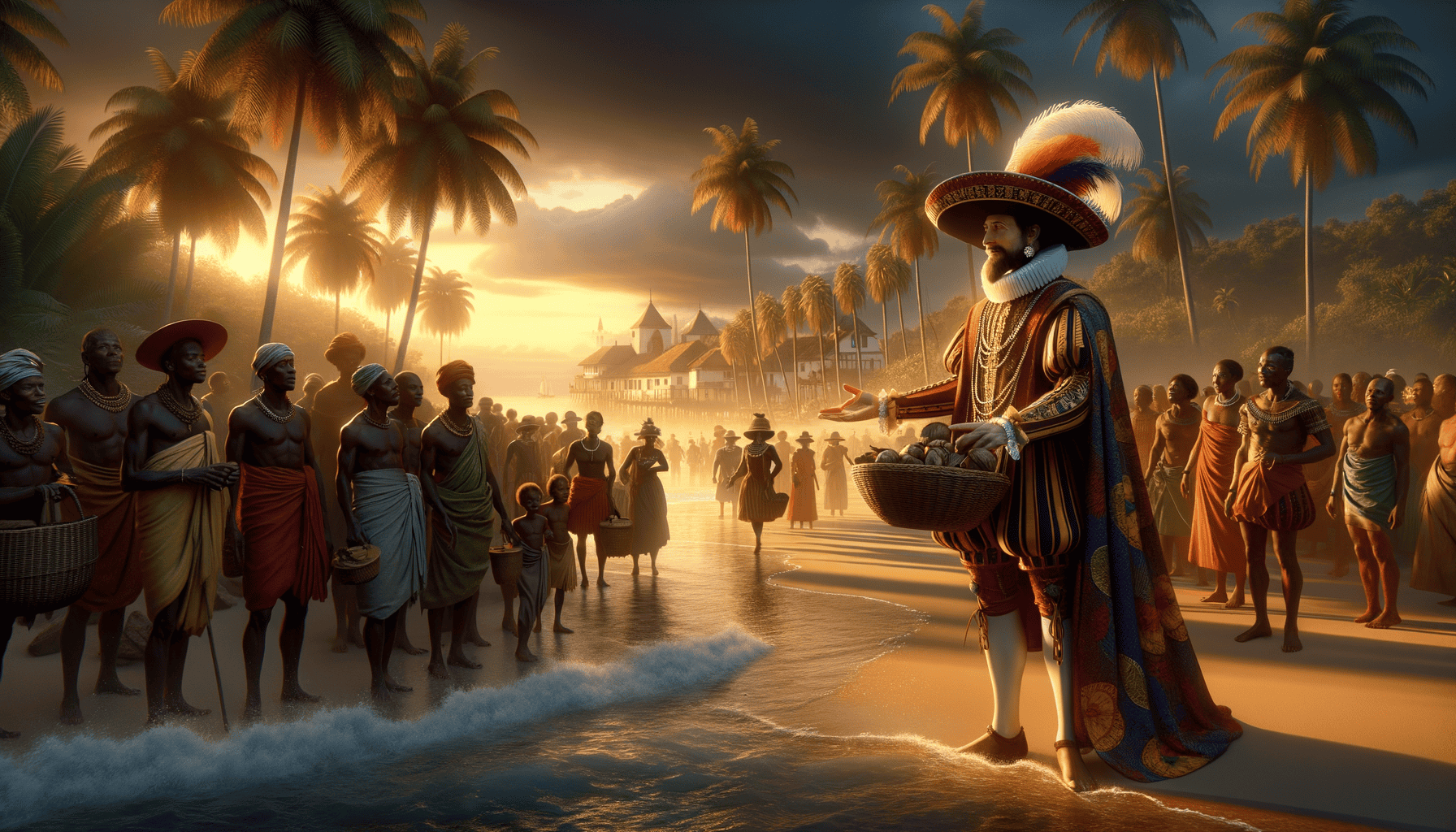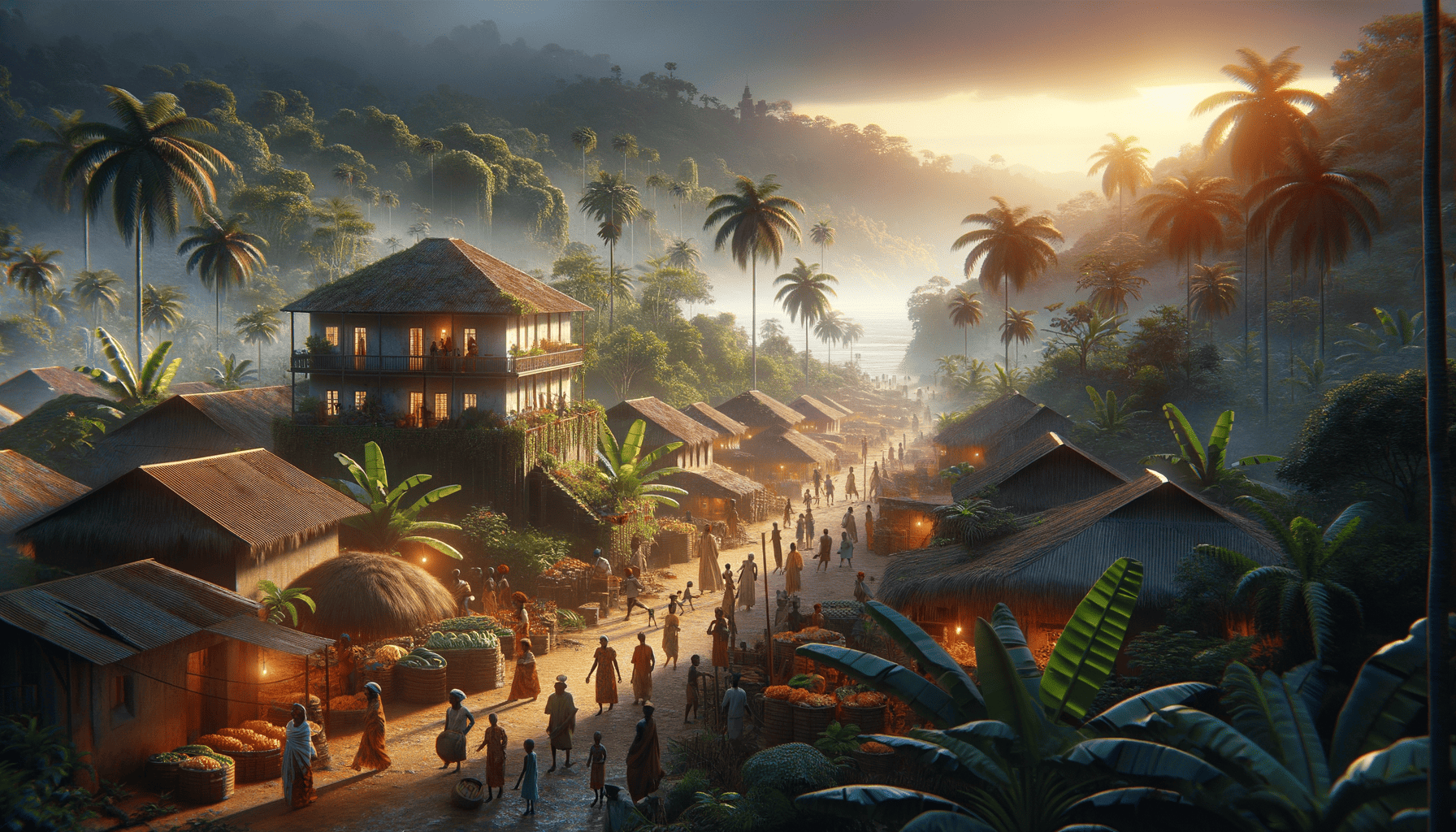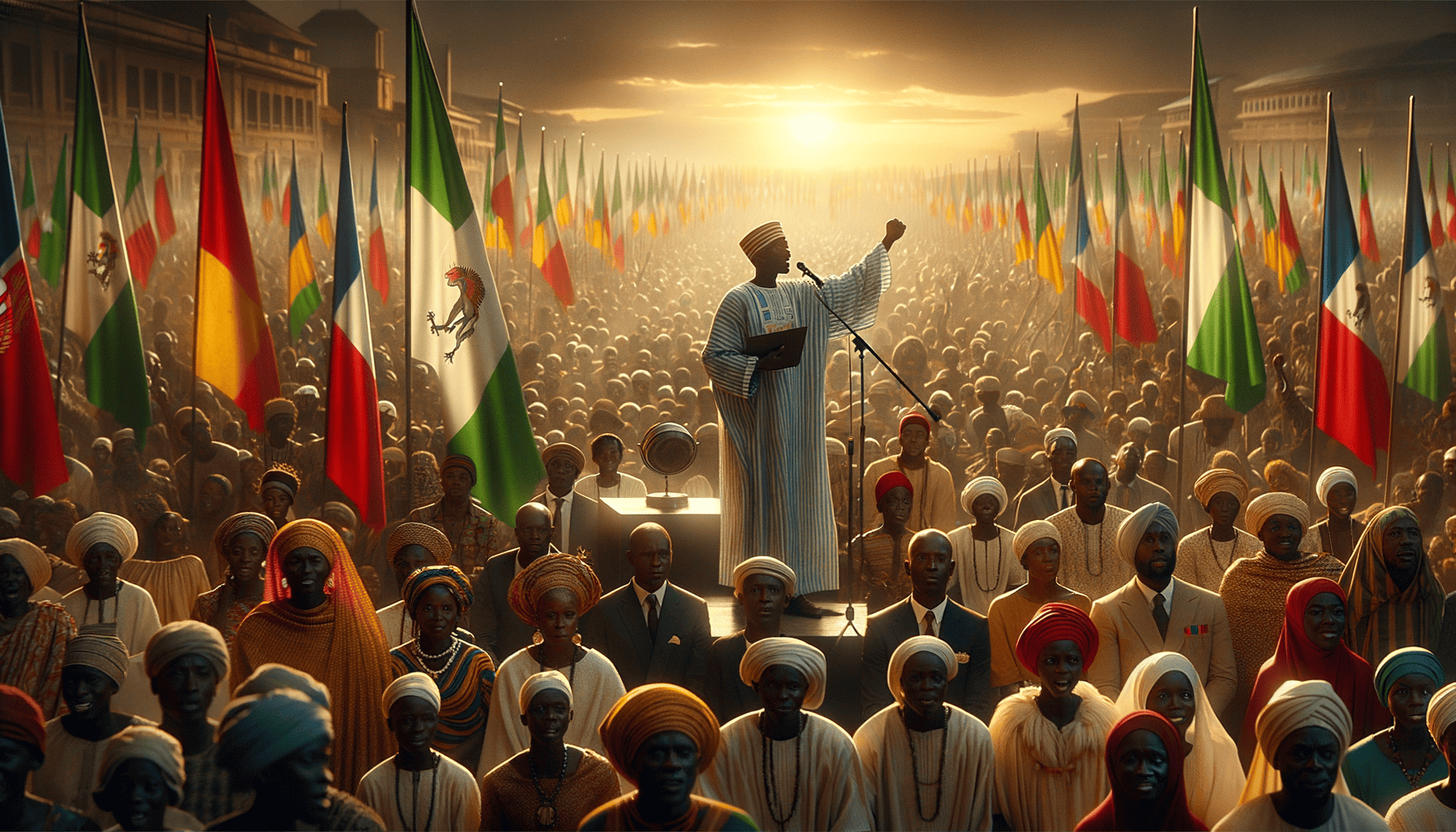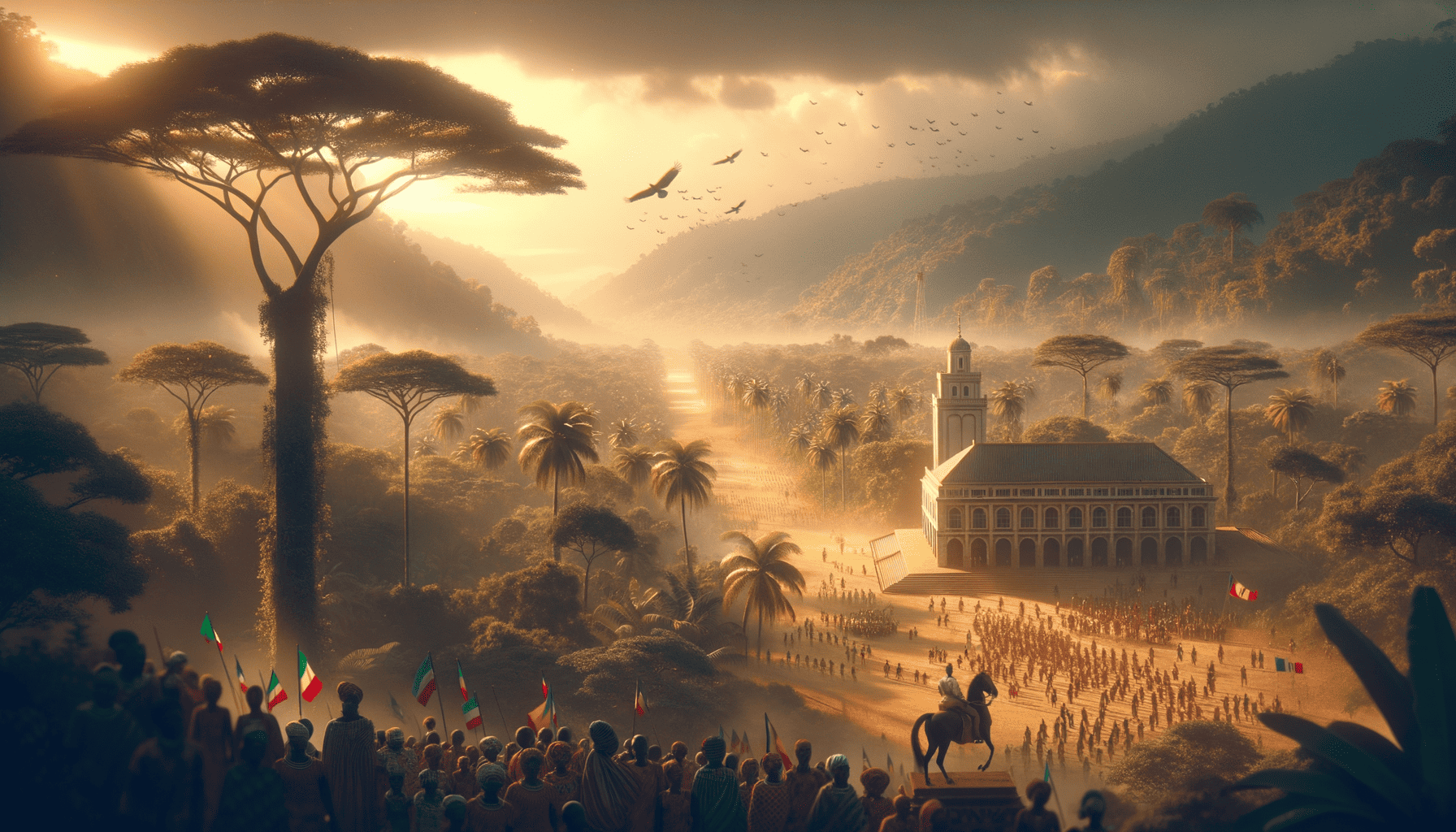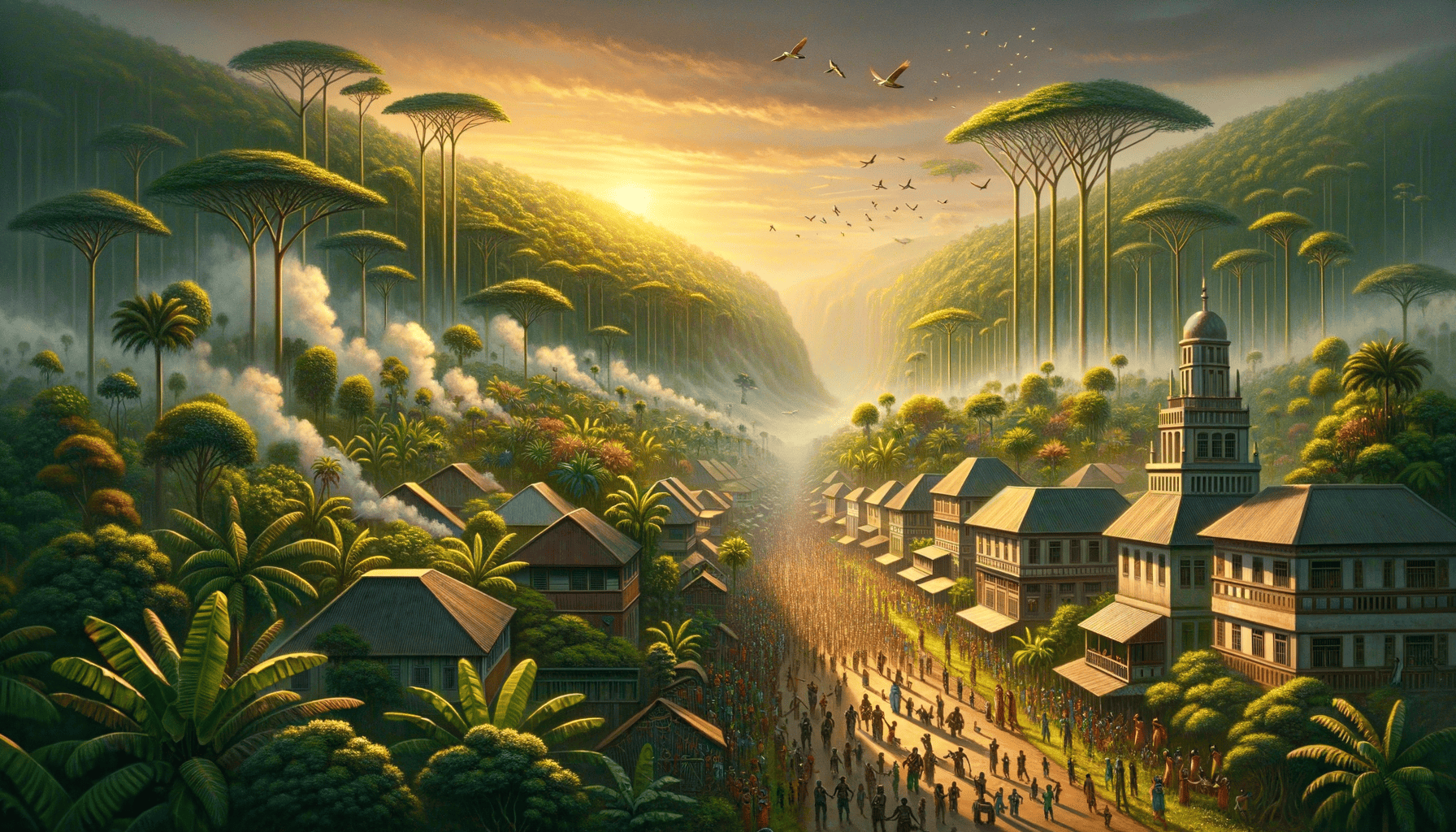Islands of Ancient Whispers
Far away in Africa, there is a special place called Equatorial Guinea. It's like having two different playgrounds – one is on the mainland where there are big forests, and the other is made up of beautiful islands in the ocean!
The biggest island is called Bioko. It looks like a giant turtle swimming in the sea! The mainland part is called Río Muni, and it’s full of tall trees and exciting animals.
Long, long ago, before there were cars or phones or television, two groups of people lived here. They were called the Bubi and the Fang. The Bubi people made their homes on Bioko Island, while the Fang lived in the forests of Río Muni.
“Our ancestors taught us to love the land,” says Grandmother Mba, a storyteller from the Fang people. “They said the forest was like our mother, giving us food and shelter.”
The Bubi were amazing fishers! They built special boats from big trees and knew all the best spots to catch fish. They also grew yams and other tasty foods on their farms near the beach.
Meanwhile, in the thick forests of Río Muni, the Fang people were excellent hunters and farmers. They built their houses from bamboo and leaves, making them strong enough to keep out the rain.
Both groups had special ways of teaching their children:
• They told stories under the stars
• They sang songs about brave heroes
• They danced to celebrate important moments
• They made beautiful masks and jewelry
• They learned to respect nature and their elders
Life in the Villages
Every village had a chief who was like a wise teacher. The chief would help solve problems and make sure everyone in the village was happy and safe.
The children loved gathering around the evening fires. That’s when the elders would share magical stories about talking animals and clever heroes. These stories taught them important lessons about being brave and kind.
The people lived in harmony with nature. They knew which plants could heal sick people and which fruits were safe to eat. They watched the clouds to know when it would rain and the stars to know when to plant their crops.
The women were especially important in both communities. They knew secret recipes for cooking special foods and making medicines. They taught their daughters these important skills, passing down wisdom from generation to generation.
Sacred Traditions
Both the Bubi and Fang people believed in powerful spirits. They thought their ancestors watched over them from a magical place. They had special ceremonies to thank the spirits for good harvests and to ask for protection.
The most exciting times were during festivals! Everyone would dress in their finest clothes, painted with bright colors. They would dance and sing until the sun came up, celebrating their connection to the land and to each other.
These ancient peoples didn't need fancy things to be happy. They had something more valuable – they had each other, their traditions, and their beautiful home in Equatorial Guinea.
The stories of the Bubi and Fang people are still told today. They remind us that sometimes the simplest ways of living can bring the most joy. Their wisdom about taking care of nature and each other continues to teach us important lessons.
As the sun sets over the forests and islands of Equatorial Guinea, new generations learn these old stories. They proudly carry on the traditions of their brave and wise ancestors, adding their own chapters to this amazing story.
Winds of Foreign Arrival
One sunny day in 1471, something very different happened in Equatorial Guinea. Big wooden ships with white sails appeared on the horizon! These were Portuguese explorers, and they had never seen these beautiful islands before.
The Portuguese sailors were amazed when they first saw Bioko Island. “Look at how green it is!” they shouted. “And see the tall mountain touching the clouds!” They named it Fernando Po, after their captain.
“When the strange ships came,” tells Elder Nsue, “our ancestors were very surprised. They had never seen people with such pale skin or such big boats before!”
First Meetings
At first, the Portuguese traders and the local people were curious about each other. They started trading things:
• The Portuguese offered cloth, shiny beads, and metal tools
But things began to change when more Europeans came. In 1778, the Spanish arrived and said, “This land belongs to us now!” They made a deal with Portugal to take control of the islands and the mainland. ☠️
New Ways of Life
The Spanish brought many changes to Equatorial Guinea:
They built new towns with stone houses instead of traditional homes
They started big farms called plantations
They made people learn Spanish and new ways of doing things
The Spanish built churches and schools. They wanted everyone to live like Europeans. But the local people held onto their special customs. They still told their stories and sang their songs, even if they had to do it quietly.
Brave Hearts
Some local leaders tried to protect their people from the Spanish rules. King Moka of the Bubi people was very brave. He told his people, “We must be strong and remember who we are!”
The Fang people were strong too. They moved deeper into the forests when they didn’t want to follow Spanish rules. They kept teaching their children the old ways while learning new things too.
Two Worlds Meeting
Life became a mix of old and new ways:
• Some people learned to speak Spanish but still spoke their native language at home
• They went to new schools but still learned traditional wisdom from their elders
• They worked on Spanish farms but kept their own small gardens with local foods
The Spanish also brought new sicknesses that hurt many people. But the local healers mixed their old medicines with new ones to help sick people get better.
Growing Together
Over time, the people of Equatorial Guinea learned to live with these big changes. They were clever and strong:
They kept the best parts of their old ways while learning useful new things
They taught their children to be proud of who they were
They stayed strong as a community even when things were hard
The Spanish weren’t always kind rulers. But the brave people of Equatorial Guinea never gave up. They kept their special culture alive in their hearts, even as their world changed around them.
More changes were coming to Equatorial Guinea. But the Bubi and Fang people had learned something very important – they could be strong and adapt while still being true to themselves.
Dark Days and Brave Hearts
The sun rose over Equatorial Guinea, but these were not happy times. The Spanish ruled with strict laws. They made everyone work very hard on big farms called plantations.
“Because these are hard times, little one,” he answered softly. “But we are strong.”
Life Under Spanish Rule
The Spanish made many changes that hurt the local people:
• They made people work very long hours
• They didn’t let people speak their own languages at school
• They changed the old ways of doing things
But the brave people of Equatorial Guinea didn’t give up! They found clever ways to keep their culture alive:
“At night, after work, we would gather secretly,” Grandmother Ela remembers. “We told our children the old stories and sang our songs very quietly.”
Secret Strength
The Bubi people on Bioko Island kept their special ceremonies hidden in the forest. The Fang people on the mainland taught their children the old dances when no one was watching.
Young people like José started asking big questions:
“Why must we follow Spanish rules?”
“When will things change?”
Seeds of Hope
Some brave leaders started speaking up. They wanted better treatment for their people. They formed small groups to talk about freedom.
They met in secret places
They wrote letters asking for help
They taught others to read and write
They dreamed of a free country
Standing Together
The people found strength in unity. When the Spanish were strict, they helped each other:
If someone needed help, friends worked together
If someone was sad, the community gave comfort
Teachers like Mr. Ndong were very brave. During Spanish lessons, he would whisper, “Never forget our own words, our own stories.”
Changes Coming
By the 1950s, things started to change. More people were learning to read and write. They heard about other African countries becoming free.
The Spanish still ruled, but they couldn’t stop people from thinking about freedom. More and more people joined together to dream of a better future. ⭐
Keeping Culture Alive
Even in hard times, people found ways to be happy:
They played traditional music on drums when they could
They told funny stories about clever animals
They danced their special dances at celebrations
They kept their medicines and healing ways
Children like little Maria learned two ways of life. At school, they learned Spanish things. At home, they learned their own culture. It wasn’t easy, but they were clever!
Looking Forward
The people of Equatorial Guinea were getting stronger. They knew changes were coming. Big dreams of freedom were growing in their hearts.
Young José whispered to his friends, “One day, we will be free. One day, we will make our own choices. One day, we will build our own future.”
The Call for Freedom
The year was 1960. Big changes were happening all over Africa. In Equatorial Guinea, people were ready for freedom.
“It means we can make our own choices,” she smiled. “We can be free.”
Brave New Leaders
Special people stepped forward to lead the fight for freedom. They were brave and smart:
• Bonifacio Ondó Edu wrote letters asking for rights
• Leaders from different tribes worked together
• They traveled to tell others about their dream of freedom
The People Unite
All across the country, people joined together. The Bubi people from Bioko Island shook hands with the Fang people from the mainland. They said, “We are one family now!”
“I remember the big meetings,” says old Mr. Ebang. “People came from every village. We sang freedom songs and planned for our new country.”
Speaking Up
The freedom fighters were peaceful but strong. They used words, not weapons:
They made speeches in villages
They sent letters to other countries
They asked the United Nations for help
World Support
Other African countries that were already free helped Equatorial Guinea. They said, “Your dreams are our dreams!”
Friends came from Ghana
Help came from Nigeria
Support came from many places
The world was watching and helping
Big Changes Coming
The Spanish government started to listen. They saw that they couldn’t stop the calls for freedom:
Schools started teaching local languages again
People could have meetings about independence
Leaders could travel to speak about freedom
Hope Grows Stronger
Little Antonio saw exciting things happening in his town:
Getting Ready
Everyone helped prepare for independence:
Teachers wrote new school books
Artists made flags and symbols
Musicians created national songs
Leaders planned new laws
The Big Meeting
In 1967, important talks began. Leaders from Equatorial Guinea met with Spanish officials in Madrid. They talked about how to make the country free.
Dreams Coming True
Antonio and his friends were so excited. “Soon we will be free!” they said. “Soon we will have our own country!” ⭐
People started preparing for the big day. They cleaned their houses, made new clothes, and practiced celebration songs. Everyone wanted to be ready for independence.
Looking to Tomorrow
The air was full of hope. People could feel that big changes were coming. Freedom was almost here!
“We will build a beautiful country,” she said. “A country where all our children can be happy.”
A New Dawn Rises
The special day finally came! On October 12, 1968, Equatorial Guinea became free. People danced in the streets. They waved new flags. Everyone was so happy!
Our Own Leaders
The people chose their first president. His name was Francisco Macías Nguema. He promised to make the country better for everyone.
“Today we start writing our own story,” the new president said. “We will work together to build our nation.”
Building Together
Everyone had jobs to do in the new country: ️
Doctors built hospitals
Farmers grew more food
Workers fixed roads
One Big Family
The islands and mainland became one country. The Bubi people and Fang people worked together. They shared their different foods, songs, and dances.
New Rules, New Ways
The country needed new rules. Leaders wrote laws to help everyone:
Everyone can vote
People can speak their own languages
All tribes have equal rights
Growing Pains
Some things were hard at first. The country was like a baby learning to walk:
They needed more teachers
Some roads needed fixing
Money was tight
But people worked hard together
Friends Around the World
Other countries helped Equatorial Guinea grow:
Nigeria sent teachers
Cuba sent doctors
The UN gave money
Many friends offered help
Proud Traditions
People celebrated their old ways in the new country:
Story-tellers taught history in schools
Artists made beautiful things
Musicians played both old and new songs
Growing Stronger
Antonio watched his country grow up. Every day brought new changes:
More cars drove on better roads
Ships came to trade at the ports
Fields grew more food
Dreams for Tomorrow
People had big hopes for their country: ⭐
“We want jobs for everyone”
“We want to keep our culture strong”
“We want peace and happiness”
Moving Forward
The new country was growing up. Every day brought new chances to make things better. Antonio and his friends knew they were part of something special.
“I will help make our country even better!” he said proudly.
Dreams Taking Flight
Many years have passed since Equatorial Guinea became free. The little country has grown so much! Let’s see what makes it special today.
Black Gold Discovery
Modern Cities Rising
Malabo, the capital city, shines bright at night:
Clean streets welcome visitors
Big stores sell everything you need
Parks give children places to play
Learning and Growing
Education is very important now. Many young people go to college. Some even study in other countries!
“My daughter is studying to be a doctor,” says Maria proudly. “When I was young, we didn’t have these chances.”
Keeping Old Ways Alive
Even with all the new things, people still love their traditions:
Festivals celebrate old dances
People wear beautiful traditional clothes
Special foods are made for holidays
Nature’s Treasures
The country takes care of its beautiful forests and animals:
Monkey families swing in trees
Colorful birds sing in the forest
Sea turtles swim near clean beaches
Rangers watch over special parks
Working Together
Different tribes still live as one big family:
Children play together at school
Everyone helps during hard times
All voices are important
Looking to Tomorrow
The country has big plans for the future: ⭐
Better roads will connect towns
New hospitals will help sick people
Clean energy will power homes
A Story of Hope
Remember little Antonio? He’s grown up now and has children of his own. He tells them:
“Our country is like a beautiful garden. If we take care of it and work together, it will keep growing stronger and more beautiful every day.”
The Journey Continues
Today, Equatorial Guinea stands proud. From ancient tribes to modern cities, from colonial times to freedom, this little country shows what people can do when they work together and dream big.


